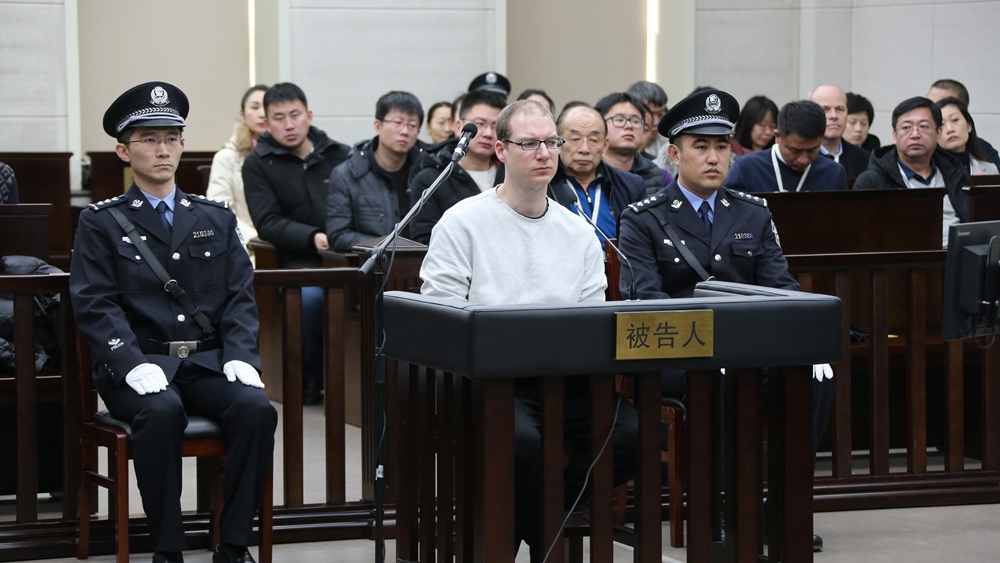
Opinions
13:09, 17-Jan-2019
Opinion: Canadian case should be discussed within legal framework
Updated
19:55, 17-Jan-2019
Zhu Zheng

Editor's note: Zhu Zheng is an assistant professor at the Law School, China University of Political Science and Law. The article reflects the author's opinion, and not necessarily the views of CGTN.
While the row, over Meng Wanzhou's case, between Beijing and Ottawa is still lingering on, another case involving a Canadian man has sparked a debate about China's law and order. The Intermediate People's Court of Dalian City, northeast China's Liaoning Province sentenced a Canadian citizen, Robert Schellenberg, to death for drug smuggling.
After verifying the evidence, the Chinese court ruled that the case was previously too leniently handled by the lower court, and in its retrial procedure, due to the newly identified evidences, it was pronounced that the 15-year jail time was not enough and the defendant should be sentenced to death instead.
The verdict was immediately criticized as politically motivated by Canada.
Canadian consular officials and the defendant's lawyer insisted that "the initial evidence was not enough to convict him," and under the current PRC Criminal Procedure Law, the additional criminal evidence presented by the prosecutors cannot be used to add to one's sentence.
00:34

Setting aside the diplomatic tussle and political allegations, the case has everything to do with the criminal procedure and jurisprudential account thereof. And if the case is read other than in terms of delivering justice and proper punishment, the judgment will be taking on a different complexion and is most likely to be subjected to political distortion.
Therefore, a strict dogmatic reading of the related provision would cast a new light on the case. According to Article 262 of the newly revised Criminal Procedure Law, when a case is remanded to the original court for new trial by the court of the second instance, the original court shall not aggravate the punishment on the defendant unless there are new facts of the crime and the people's procuratorate has initiated supplementary prosecution.
Hence, it is evident that the kernel of the Canadian case lies in how to understand the meaning of "new facts of the crime." In normal sense, it appears that should no new facts be identified, Schellenberg ought to be granted the original lighter sentence.
However, there coexist two versions of interpretation on "new facts of the crime," which are diametrically opposite.
The first reading of the phrase "new facts of the crime" may refer to facts that were previously neglected by the procuratorate, but severe enough that would lead to a new crime prosecution. In other words, the new facts exclude those merely affecting the sentencing of the formerly charged crime.

Canadian Robert Schellenberg stands trial at the Intermediate People's Court of Dalian City in northeast China's Liaoning Province, January 14, 2019. /CGTN Photo
Canadian Robert Schellenberg stands trial at the Intermediate People's Court of Dalian City in northeast China's Liaoning Province, January 14, 2019. /CGTN Photo
This understanding is echoed in a guideline book on Criminal Procedure Law compiled by the National People's Congress Standing Committee (NPCSC), the supreme legislative body in China, which, though not binding, unveils such logic that not all new facts would constitute exception in Article 262, and sentences in retrial hearing should be always commuted rather than aggravated.
The second perception of the provision points to an opposite direction, which mingles "new crime" with "new sentencing, arguing that as long as necessary, any new facts should be construed as possibly new ground for retrial case to be treated more heavy-handedly.
Clearly, different understandings of the term would have a huge impact on the outcome of the case. For example, if the term is narrowly construed, Schellenberg would be more leniently treated and the sentencing should not be aggravated. Yet, if the second version is adopted, capital punishment is legally feasible.
No matter which version the court picks, it is important to note that this is a legal issue replete with uncertainties and complexities. Unless heavily engaging in digging out the true meaning of the provision, nobody should be able to find a convincing answer.
In this sense, drawing a rash conclusion that "China is arbitrarily enforcing laws" is genuinely ill-founded, which is in itself falling foul of the true spirit of the rule of the law.
(If you want to contribute and have specific expertise, please contact us at opinions@cgtn.com.)

SITEMAP
Copyright © 2018 CGTN. Beijing ICP prepared NO.16065310-3
Copyright © 2018 CGTN. Beijing ICP prepared NO.16065310-3